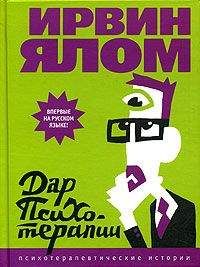Ирвин Ялом - The Schopenhauer Cure
Скачивание начинается... Если скачивание не началось автоматически, пожалуйста нажмите на эту ссылку.
Жалоба
Напишите нам, и мы в срочном порядке примем меры.
Описание книги "The Schopenhauer Cure"
Описание и краткое содержание "The Schopenhauer Cure" читать бесплатно онлайн.
by the debris of the past. Allow me to make one marginal note: I refer to a Nietzsche
essay, but this thought was not original—in this, as in so much else, he looted the works
of Schopenhauer.»
He paused. A loud silence rang out in the group. Julius squirmed in his chair,
thinking, Oh shit, I must have been out of my fucking mind to bring this guy here. This is
the goddamnedest, most bizarre way I`ve ever seen a patient come into a group.
Bonnie broke the silence. Turning her gaze squarely upon him, she said, «That`s
fascinating, Philip. I know I keep yearning for my childhood, but I never understood it
that way, that childhood feels free and golden because there`s no past to weigh you down.
Thanks, I`m going to remember that.»
«Me too. Interesting stuff,” said Gill. «But you said you had advice for me?»
«Yes, here`s my advice.» Philip spoke evenly, softly, still making no eye contact.
«Your wife is one of those people who is particularly unable to live in the present because
she is so heavily laden with the freight of the past. She is a sinking ship. She`s going
down. My advice to you is to jump overboard and start swimming. She`ll produce a
powerful wake when she goes under, so I urge you to swim away as fast and as hard as
you can.»
Silence. The group seemed stunned.
«Hey, no one is going to accuse you,” said Gill, «of pulling your punches. I asked a
question. You gave an answer. I appreciate that. A lot. Welcome to the group. Any other
comments you got—I want to hear them.»
«Well,” said Philip, still looking upward, «in that case let me add one additional
thought. Kierkegaard described some individuals as being in вЂdouble despair,` that is,
they are in despair but too self–deceived to know even that they are in despair. I think you
may be in double despair. Here`s what I mean: most of my own suffering is a result of
my being driven by desires, and then, once I satisfy a desire, I enjoy a moment of
satiation, which soon is transformed into boredom, which is then interrupted by another
desire springing up. Schopenhauer felt this was the universal human condition—wanting,
momentary satiation, boredom, further wanting.
«Back to you—I question whether you`ve yet explored this cycle of endless desires
within yourself. Perhaps you`ve been so preoccupied with your wife`s wishes it`s kept
you from becoming acquainted with your own desires? Isn`t that why others here were
applauding you today? Wasn`t it because you were finally refusing to be defined by her
wishes? In other words, I`m asking whether your work on yourself has been delayed or
derailed by your preoccupation with your wife`s wishes.»
Gill listened, mouth gaping, gaze fixed on Philip. «That`s deep. I know there`s
something deep and important in what you`re saying—in this double despair idea—but
I`m not getting it all.»
All eyes were now on Philip, who continued to have eyes only for the ceiling.
«Philip,” said Rebecca, now finished with replacing her barrettes, «weren`t you saying
that Gill`s personal work won`t really begin until he liberates himself from his wife?»
«Or,” Tony said, «that his involvement with her prevents him from knowing how
fucked–up he really is? Hell, I know this is true for me and the way I relate to my work—
I been thinking this past week that I`m so busy being ashamed of being a carpenter—
being blue–collar, being low–income, being looked down on—that I never get around to
thinking about the real shit I should be dealing with.»
Julius watched in amazement as others, thirsty for Philip`s every word, chimed in.
He felt competitive urges rising but quelled them by reminding himself that the group`s
purposes were being served.Cool it, Julius, he said to himself,the group needs you;
they`re not going to desert you for Philip. What`s going on here is great; they are
assimilating the new member, and they are also each laying out agendas for future work.
He had planned to talk about his diagnosis in the group today. In a sense his hand
was now forced because he had already told Philip he had a melanoma and, to avoid the
impression of a special relationship with him, had to share it with the whole group. But
he had been preempted. First there was Gill`s emergency, and then there was the group`s
total fascination with Philip. He checked the clock. Ten minutes left. Not enough time to
lay this on them. Julius resolved that he would absolutely begin the next meeting with the
bad news. He remained silent and let the clock run out.
12
1799—Arthur
Learns about
Choice and
Other Worldly
Horrors
_________________________
Thekings left their crowns and
scepters behind here, and the
heroes their weapons. Yet the
great spirits among them all,
whose splendor flowed out of
themselves, who did not
receive it from outward
things, they take their
greatness across with them.
—Arthur Schopenhauer, age sixteen at
Westminster Abbey
_________________________
When the nine–year–old Arthur returned from Le Havre, his father placed him in a private
school whose specific mandate was to educate future merchants. There he learned what
good merchants of the time had to know: to calculate in different currencies, to write
business letters in all the major European languages, to study transport routes, trade
centers, yields of the soil, and other such fascinating topics. But Arthur was not
fascinated; he had no interest in such knowledge, formed no close friendships at school,
and dreaded more each day his father`s plan for his future—a seven–year apprenticeship
with a local business magnate.
What did Arthur want? Not the life of a merchant—he loathed the very idea. He
craved the life of a scholar. Though many of his classmates also disliked the thought of a
long apprenticeship, Arthur`s protests ran far deeper. Despite his parents` strong
admonitions—a letter from his mother instructed him to «put aside all these authors for a
while...you are now fifteen and have already read and studied the best German, French
and, in part, also English authors»—he spent all his available free time studying literature
and philosophy.
Arthur`s father, Heinrich, was tormented by his son`s interests. The headmaster of
Arthur`s school had informed him that his son had a passion for philosophy, was
exceptionally suited for the life of a scholar, and would do well to transfer to a
gymnasium which would prepare him for the university. In his heart, Heinrich may have
sensed the correctness of the schoolmaster`s advice; his son`s voracious consumption and
comprehension of all works of philosophy, history, and literature in the extensive
Schopenhauer library was readily apparent.
What was Heinrich to do? At stake was his successor, as well as the future of the
entire firm and his filial obligation to all his ancestors to maintain the Schopenhauer
lineage. Moreover, he shuddered at the prospect of a male Schopenhauer subsisting on
the limited income of a scholar.
First, Heinrich considered setting up a lifelong annuity through his church for his
son, but the cost was prohibitive; business was bad, and Heinrich also had obligations to
guarantee the financial future of a wife and daughter.
Then gradually a solution, a somewhat diabolical solution, began to form in his
mind. For some time he had resisted Johanna`s pleas for a lengthy tour of Europe. These
were difficult times; the international political climate was so unstable that the safety of
the Hanseatic cities was threatened and his constant attention to business was required.
Yet because of weariness and his yearning to shed the weight of business responsibilities,
his resistance to Johanna`s request was wavering. Slowly there swiveled into mind an
inspired plan that would serve two purposes; his wife would be pleased, and the dilemma
of Arthur`s future would be resolved.
His decision was to offer his fifteen–year–old son a choice. «You must choose,” he
told him. «Either accompany your parents on a year`s grand tour of all of Europe or
pursue a career as a scholar. Either you give me a pledge that on the day you return from
the journey you will begin your business apprenticeshipor forego this journey, remain in
Hamburg, and immediately transfer to a classical educational curriculum which will
prepare you for the academic life.»
Imagine a fifteen–year–old facing such a life–altering decision. Perhaps the ever–pedantic Heinrich was offering existential instruction. Perhaps he was teaching his son
that alternatives exclude, that for every yes there must be a no. (Indeed, years later Arthur
was to write, «He who would be everything cannot be anything.»)
Or was Heinrich exposing his son to a foretaste of renunciation, that is, if Arthur
could not renounce the pleasure of the journey, how could he expect himself to renounce
worldly pleasures and live the impecunious life of a scholar?
Perhaps we are being too charitable to Heinrich. Most likely his offer was
disingenuous because he knew that Arthur would not, could not, refuse the trip. No
fifteen–year–old could do that in 1803. At that time such a journey was a priceless once–in–a–lifetime event granted only to a privileged few. Before the days of photography,
foreign places were known only through sketches, paintings, and published travel
journals (a genre, incidentally, that Johanna Schopenhauer was later to exploit
brilliantly).
Did Arthur feel he was selling his soul? Was he tormented by his decision? Of
these matters history is silent. We know only that in 1803, in his fifteenth year, he set off
with his father, mother, and a servant on a journey of fifteen months throughout all of
western Europe and Great Britain. Adele, his six–year–old sister, was deposited with a
relative in Hamburg.
Arthur recorded many impressions in his travel journals written, as his parents
required, in the language of the country visited. His linguistic aptitude was prodigious;
the fifteen–year–old Arthur was fluent in German, French, and English and had working
knowledge of Italian and Spanish. Ultimately, he was to master a dozen modern and
ancient languages, and it was his habit, as visitors to his memorial library have noted, to
write his marginal notes in the language of each text.
Arthur`s travel journals offer a subtle prefiguring of interests and traits which were
aggregating into a persistent character structure. A powerful subtext in the journals is his
fascination with the horrors of humanity. In exquisite detail Arthur describes such
arresting sights as starving beggars in Westphalia, the masses running in panic from the
impending war (the Napoleonic campaigns were incubating), thieves, pickpockets, and
drunken crowds in London, marauding gangs in Poitiers, the public guillotine on display
in Paris, the six thousand galley slaves, on view as in a zoo, in Toulon doomed to be
chained together for life in landlocked naval hulks too decrepit to put out to sea ever
again. And he described the fortress in Marseilles, which once housed the Man in the Iron
Mask, and the black death museum, where letters from quarantined sections of the city
were once required to be dipped into vats of hot vinegar before being passed on. And, in
Lyon, he remarked on the sight of people walking indifferently over the very spot where
their fathers and brothers were killed during the French Revolution.
At a boarding school in Wimbledon where Lord Nelson had once been a student in
England, Arthur perfected his English and attended public executions and naval
floggings, visited hospitals and asylums, and walked by himself through the massive
teeming slums of London.
The Buddha as a young man lived in his father`s palace, where the common lot of
mankind had been veiled from him. It was only when he first journeyed outside of his
father`s palace that he saw the three primal horrors of life: a diseased person, a decrepit
old man, and a corpse. His discovery of the tragic and terrible nature of existence led the
Buddha to his renunciation of the world and the search for a relief from universal
suffering.
For Arthur Schopenhauer, too, early views of suffering profoundly influenced his
life and work. The similarity of his experience to that of the Buddha was not lost on him,
and years later, when writing about his journey, he said, «In my seventeenth year, without
any learned school education, I was gripped by the misery of life, just like Buddha in his
youth, when he saw sickness, pain, aging, and death.»
Arthur never had a religious phase; he had no faith but, when young, had a will to
faith, a wish to escape the terror of a totally unobserved existence. Had he a belief in the
existence of God, though, it would have been sorely tested by his teenaged tour of the
horrors of European civilization. At the age of eighteen he wrote, «This world is
supposed to have been made by a God? No, much better by a devil!»
13
_________________________
When,at the end of their
lives, most men look back they
will find that they have lived
throughout ad interim. They
will be surprised to see that
the very thing they allowed to
slip by unappreciated and
unenjoyed was just their life.
And so a man, having been
duped by hope, dances into the
arms of death.
_________________________
The trouble with a kitten is that
Eventually it becomes a cat.
The trouble with a kitten is that
Eventually it becomes a cat.
Jerking his head to dislodge the annoying couplet from his mind, Julius sat up in bed and
opened his eyes. It was 6A.M. , a week later, the day of the next group meeting, and those
odd Ogden Nash lines looping around in his mind had been the background music for yet
another night of unsatisfying sleep.
Though everyone agrees that life is one goddamned loss after another, few know
that one of the most aggravating losses awaiting us in later decades is that of a good
night`s sleep. Julius knew that lesson all too well. His typical night consisted of tissue–thin dozing which almost never entered the realm of deep, blessed delta–wave slumber, a
sleep that was interrupted by so many awakenings that he often dreaded going to bed.
Like most insomniacs, he awoke in the morning believing either that he had slept far
fewer hours than he actually had or that he had been awake all night long. Often he could
assure himself that he had slept only by carefully reviewing his nocturnal thoughts and
realizing that he would never, in a waking state, have ruminated at such length about such
Подписывайтесь на наши страницы в социальных сетях.
Будьте в курсе последних книжных новинок, комментируйте, обсуждайте. Мы ждём Вас!
Похожие книги на "The Schopenhauer Cure"
Книги похожие на "The Schopenhauer Cure" читать онлайн или скачать бесплатно полные версии.
Мы рекомендуем Вам зарегистрироваться либо войти на сайт под своим именем.
Отзывы о "Ирвин Ялом - The Schopenhauer Cure"
Отзывы читателей о книге "The Schopenhauer Cure", комментарии и мнения людей о произведении.








